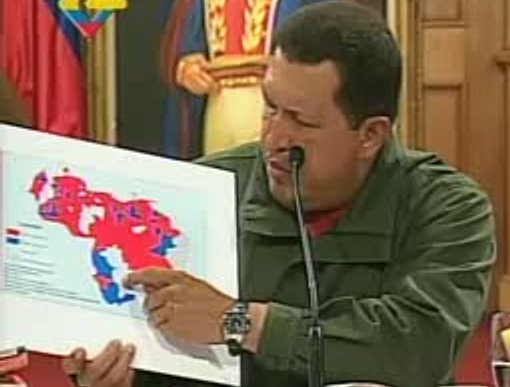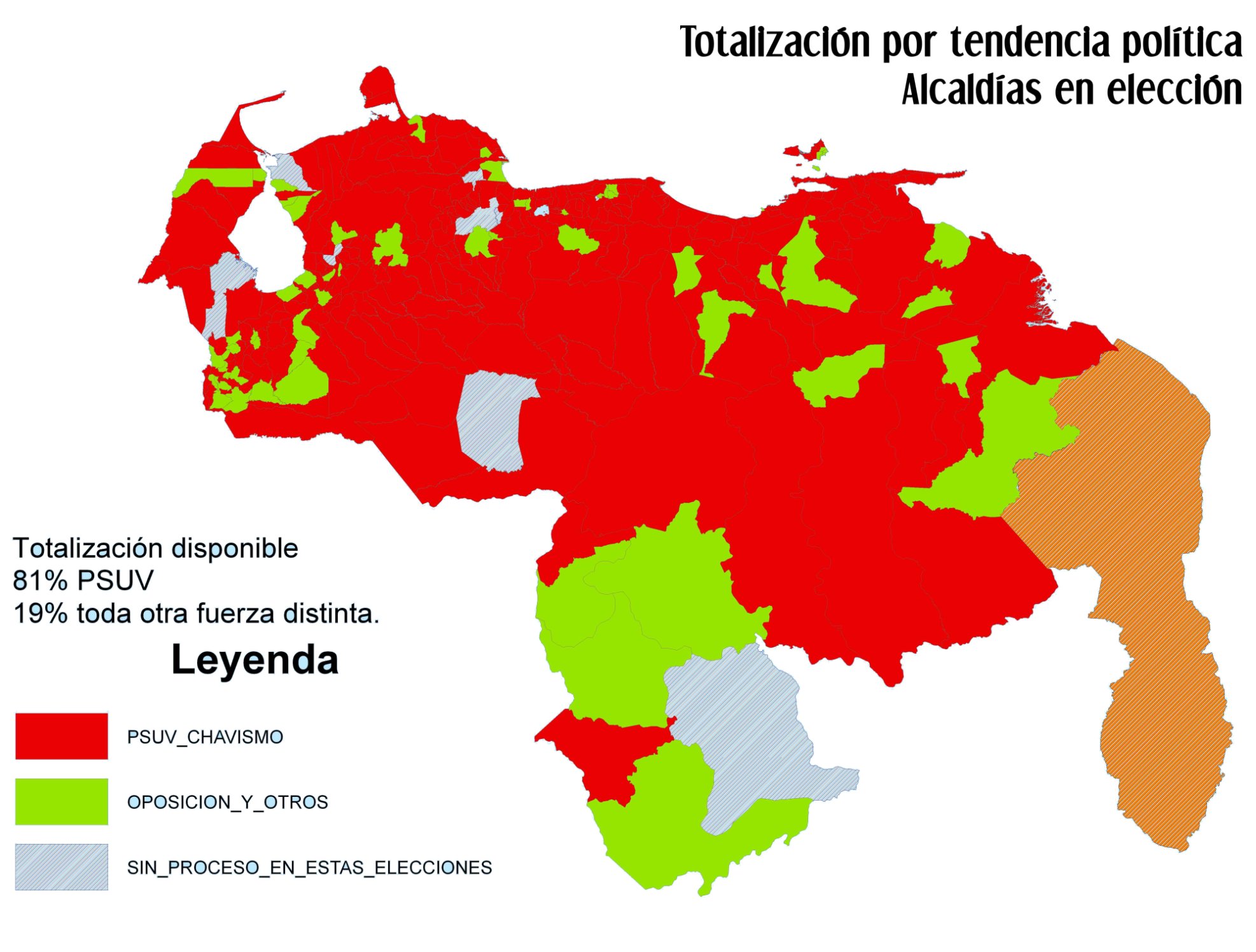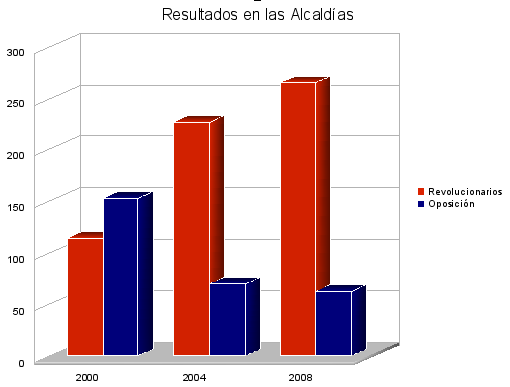Venezuelan Elections: A Victory for the PSUV, A Warning for the Revolution
- 04 December 2008
The final results of the Venezuelan elections are now out. The Socialist United Party of Venezuela (PSUV) has won about 80% of all local councils and 17 out of the 22 governors that were up for election (there were no elections in the state of Amazonas, ruled by a pro-Chavez governor). The PSUV won in three states, Sucre, Aragua and Guarico, where the governors had been elected on a Bolivarian ticket but had then joined the opposition. Meanwhile, oil-rich Zulia in the border with Colombia and tourist island state of Nueva Esparta remain in opposition hands. To this we have to add the loss of two important positions, the Caracas Alcaldía Metropolitana (Greater Caracas Council) to opposition leader Antonio Ledezma, and Miranda state (surrounding and including parts of the capital city) to Capriles Radonsky. Finally, the industrial state Carabobo and the border region of Táchira, where the results were close and were not announced immediately, also fell into the hands of the opposition.
 |
| Chávez shows a map showing council election results |
The Libertador Council in Caracas (the most populated one in the capital) remains in the hands of the revolution, while the Sucre Council also in Caracas (second largest) fell to the opposition.
In those states where the PSUV won, it did so by a large margin. More than 10% points over the opposition in 8 states, between 20 and 30 points in 4 states, more than 30 in two others, and more than 50 points advantage in Monagas and Lara. The opposition only won one state with a sizeable majority (more than 10 points in Nueva Esparta) with the rest of the victories being extremely narrow.
If you take number of votes, PSUV and other Bolivarian candidates for governor received a total of 5.5 million (around 58%), while opposition candidates received just 4 million votes (41%). This means that if you compare these results to those of the constitutional reform referendum one year ago, the revolutionary forces have won an additional 1.1 million votes, while the opposition has lost nearly half a million.
In the local elections, the PSUV won 263 councils, and an additional 14 were won by PSUV allies, while the opposition only won 56. In relation to 2004, the forces of the revolution have increased control over 52 councils, while the opposition has lost 14. Even in states where the opposition won the governor, the PSUV has made important advances at the local level. This is particularly the case in Zulia where the Bolivarians win 13 out of 19 councils (previously they only had 5), or Carabobo where the PSUV won in 11 out of 13 councils (including the capital Valencia for the first time).
However the loss of Miranda, Carabobo and the Metropolitan District of Caracas, all of them extremely important from the point of view of politics, economy and population, and the fact that the PSUV did not win Zulia (something which had been hoped for) is a serious warning for the revolution, which has to be added to the defeat of the constitutional reform referendum.
There are specific reasons for some of these setbacks. The defeat in Táchira was very narrow (6,400 votes or 1.2%) and was helped by the fact that there was a dissident Bolivarian candidate who received 6,200 votes.
In Carabobo, the sitting "Bolivarian" governor Acosta Carles had been marred by corruption scandals, and accused of financial irregularities. He is a typical representative of the corrupt and bureaucratic breed of politicians that occupies many of the elected positions of the chavista movement. He was expelled from the PSUV, the right thing to do, but then stood as an independent and managed to receive 56,000 votes (6.5%) just enough to prevent the election of PSUV candidate Mario Silva (who lost by 25,000 votes, or 3%).
In Miranda, the only place where a sitting Bolivarian governor stood for election and lost, the candidate, Diosdado Cabello, is widely discredited amongst the revolutionary rank and file and is seen as the most outspoken representative of what is known as the derecha endógena, the bourgeois right wing of the Bolivarian movement. He was not elected in the internal elections to the PSUV leadership, but was smuggled back in by Chavez as a regional vice-president. Miranda state includes part of the capital, particularly the Sucre council in the East, a mixture of working class and poor revolutionary barrios and petty bourgeois and upper class urbanizaciones. Sucre council had been ruled by another right wing "Bolivarian" bureaucrat, Rangel, who had also become widely discredited.
 |
| Map of states: Red - PSUV win; Blue - Oppositon win |
These elections had a very high level of participation (more than 65%, 15 percentage points higher than the previous regional elections in 2004). The fact that the revolutionary forces managed to increase their vote by more than 1 million in relation to the constitutional reform referendum is due mainly to the active participation of Chavez himself in the campaign. At the beginning of the election campaign the mood amongst the Bolivarian masses was flat, and there was even talk of losing 10 states. Only when Chavez threw himself into the campaign, visiting all of the states in dispute and some of them on several occasions, did the Bolivarian masses rally behind the candidates (some of them known right wing bureaucrats and anti-working class politicians like Rangel in Bolivar, who ordered the National Guard against SIDOR workers earlier this year).
This underlines once again the enormous reservoir of support for the revolution, and for Chavez himself, whom the masses identify more clearly with the idea of socialism. At the some time it reveals the poverty and greyness of many of the other components of the leadership of the movement, grey career politicians who do not inspire any revolutionary fervour.
The high turn out also means that the opposition mobilised their social base of support to turn out to vote. These elections became a referendum about Chávez and socialism and this is the way most people saw them. But the opposition had already mobilised massively during the presidential elections in December 2006 when they received 4.3 million votes, and the constitutional referendum of December 2007, when they received 4.5 million.
Abstention in revolutionary strongholds
The difference this time, as with the referendum, was not so much the amount of votes for the opposition, but rather, abstention amongst those who traditionally have supported the revolution. The highest point of support for the revolution from an electoral point of view was the presidential election in 2006, when Chavez received 7.3 million votes. That was also an extremely polarised election, in which Chavez put the issue of socialism in the centre of the campaign, and the Venezuelan workers and poor responded massively and in an enthusiastic way. They voted to defend the gains of the revolution and to move forward to socialism in a decisive way.
However, after that election, no decisive action was taken in the direction of socialism. The ruling class organised a campaign of sabotage of the economy, particularly the distribution of food. That opened a golden opportunity to expropriate the oligarchy. A law was even passed to allow for it. But no serious measures were taken and the referendum was lost.
 |
| Map of councils: Red - PSUV win; Green - Oppositon win |
The impact of the impressive social gains of the revolution, mainly in the fields of education and health care through the misiones, was felt mainly between 2003 and 2006. Now that people have had access to education and health care, their expectations have been raised. They want the revolution to solve their most pressing needs in relation to food scarcity and price increases, housing, jobs, crime ...
But none of these problems can really be solved within the limits of the capitalist system. At the beginning of his mandate, Caracas Metropolitan Mayor Barreto became extremely popular by starting to implement a policy of expropriation of urban land and housing, trying to solve the problems of housing facing hundreds of thousands of caraqueños. He came under strong pressure of bourgeois public opinion and the right wing of the Bolivarian leadership. He abandoned his radical policies and concentrated on organising cultural events and other high profile stunts which did not solve any concrete problems. We wonder whether he was advised by London Mayor Ken Livingstone, but he has ended up the same way.
It is not only that many of the daily problems of Venezuelan working people have not been solved. Added to that we have the fact that in many occasions, when workers and the poor take the initiative, through direct action, to solve them in an organised way, they are faced with the demoralising wall of the bureaucracy, inefficiency and corruption. This comes both from the old structures of the capitalist state which remain largely intact and from the new "Bolivarian" bureaucracy which is scared to death of the direct participation of working people. To add insult to injury, those who organised the reactionary coups and plots of the opposition are free to walk the streets and have never been put on trial. This includes the newly elected governor of Miranda, Radonsky, who participated in the assault of the Cuban embassy during the coup in April 2002, Antonio Ledezma, the new Metropolitan Mayor of Caracas who participated in the coup in 2002, and Enrique Salas Feo, winner in Carabobo, who played an active role both in the coup in April 2002 and in the oil lock-out in December 2002, amongst many others.
In this context, to many, speeches about socialism do not mean anything anymore.
The fact that abstention amongst the Bolivarian masses is what lost key states in these elections can be very easily verified by looking at the actual figures.
 |
| Evolution of local councils over last three elections |
Take the Sucre council in the East of Caracas, which is part of the Miranda state and at the same time of the Caracas Metropolitan Council and was key in losing both. Within these council there are middle class areas, like the Leoncio Martinez parish, where the opposition traditionally wins, which voted 81% for the opposition, 19% for the PSUV. Here abstention was 35%, the national average. However in working class and poor areas of the same council, where the PSUV won, abstention was significantly higher. In Caicaguita (64% for the PSUV) abstention was 43%, in Filas de Mariches (PSUV got 75%) abstention was 44%, in La Dolorita (70% for the PSUV) abstention was 40%. In the Petare parish, the largest in the council, Chavez received 112,000 votes in December 2006, for 96,000 for the opposition, abstention was 27%. This time, the PSUV candidate, Aristóbulo Isturiz, received 77,000 votes, for 97,000 for opposition candidate Ledezma, with abstention at 40%. The opposition barely increased, the revolutionary vote went down by 35,000.
Similar figures can be produced for working class and poor areas around the capital and throughout the country. In the Antímano and Sucre parishes in the West of the capital, strongholds of the revolution, abstention was 44 and 41%. In the escualido areas of El Hatillo (East of Caracas) where 81% voted for the opposition and San Antonio de los Altos (Miranda) where the opposition received 78%, abstention was only 31% and 28%, below the national level.
What conclusions from these results?
The results this time were better than at the time of the constitutional reform referendum. It is correct to counter the lies and propaganda of the capitalist media who now argue that Venezuela has voted against Chavez. However it cannot be argued that this is a victory and all is rosy in the garden. As an activist in the Caracas PSUV said: "If this is a victory, why do I feel so bad about it?" It cannot be argued, as some do in the Bolivarian leadership, that the problem was one of logistics. That the revolutionary activists failed to put the technical means to bring people to the polling stations. Some are even suggesting that a new electoral law is needed to bring more polling stations to poor areas where ten years ago people just did not participate in elections. All this might be needed, but it certainly did not prevent the revolutionary masses of workers and the poor from turning out en masse in December 2006!
The reasons for this setback are not technical but political. This is what we have been arguing for some time. These results need to be analysed in a sober minded way as another warning to the revolution. Unless the concrete problems of the masses are solved, disillusionment, demoralisation and scepticism can set in and create the conditions for the oligarchy to come back.
The defeat of the referendum last year was interpreted by many in the right wing of the Bolivarian movement to mean that "the masses were not ready for socialism", "we went too far too fast", etc. They pushed for a line of collaboration with the oligarchy, opening up negotiations with the capitalists, offering them all sorts of incentives and lifting price controls. As was to be expected, none of this worked. Private investment is still at an extremely low level and the oligarchy continues to sabotage the distribution of basic products.
Assault against gains of the revolution
It is less than a week since the opposition won in some councils and regions and they have already launched an assault against the revolutionary movement and the gains of the revolution. In Carabobo, Miranda and the Caracas Metropolitan area there are many reports of such attacks. Reactionary thugs from Primero Justicia threatened to close down Radio Voz de Guaicaipuro, a revolutionary radio station in Los Teques, Miranda. Also in Los Teques there were clashes between police officers loyal to the new right governor and the revolutionary people, when the police tried to take over the Town Hall, controlled by a PSUV mayor. The newly elected mayor of Caracas is threatening to remove the whole team of Avila TV, run by young revolutionary activists in the capital. There were also reports of groups of thugs evicting communal councils from the buildings they were using in Baruta, in the East of Caracas. Many of the sites for the educational programmes have been locked by opposition governors, and there have been threats against Cuban doctors and the Barrio Adentro programme in Miranda and Carabobo. Also in Mariches, Sucre council, Primero Justicia thugs attempted to evict the misiones from the buildings they were using, arguing that "now we rule Miranda", but were repelled by the organised people who organised their defence.
The counter-revolution now feels stronger, emboldened by their electoral advances. But the revolutionary people have not been defeated and as the experience of past revolutions shows, sometimes the whip of counter-revolution can spur a radicalisation of the revolutionary movement.
Forward to socialism!
The balance of forces is still favourable, as reflected in the overall result: 5.4 million against 4 million. There are hundreds of thousands more (more than a million in fact) who voted for socialism in December 2006 who could be enthused with a bold policy.
The only way to break through this deadlock is if the working class enters the scene in a clear way. So far, the revolutionary potential of the UNT trade union has been paralysed by its leadership, divided amongst those who are scared to death of the revolutionary initiative of the workers and those who take a hopeless sectarian position towards the revolutionary movement of the masses. The recent gathering of UNT trade unions in Zulia showed the way forward: to unite the UNT on the basis of the struggle for socialism and workers' control.
The world capitalist system is in crisis and this crisis is unfolding in front of the eyes of millions of people. This crisis is already affecting Venezuela, with lower oil prices, shrinking demand for other raw materials and manufactured goods. This will mean a much-reduced possibility to use the oil resources to fund social programmes and massive investment in public works, which is the only thing that has kept the economy going, despite the strike of capital on the part of the oligarchy.
The attempt to regulate the capitalist economy cannot work and has not worked. A policy of social spending and public works and limits on the free activity of private businesses, while the economy remains capitalist, will only produce inflation, a strike of capital and economic sabotage. What you don't control you cannot plan and what you don't own you can't control.
The choice will now be posed in a much clearer way: the expropriation of the capitalist class to allow for a democratic plan of production under the control of working people, so that the vast resources of Venezuela can be put to productive use in the benefit of the majority. Chavez, in his analysis of the election results said that this was a new mandate for socialism. Socialism can only be implemented through the nationalisation of the land, banks and main industries under democratic workers' control.
Source: In Defence of Marxism

 Please help build the campaign by
Please help build the campaign by